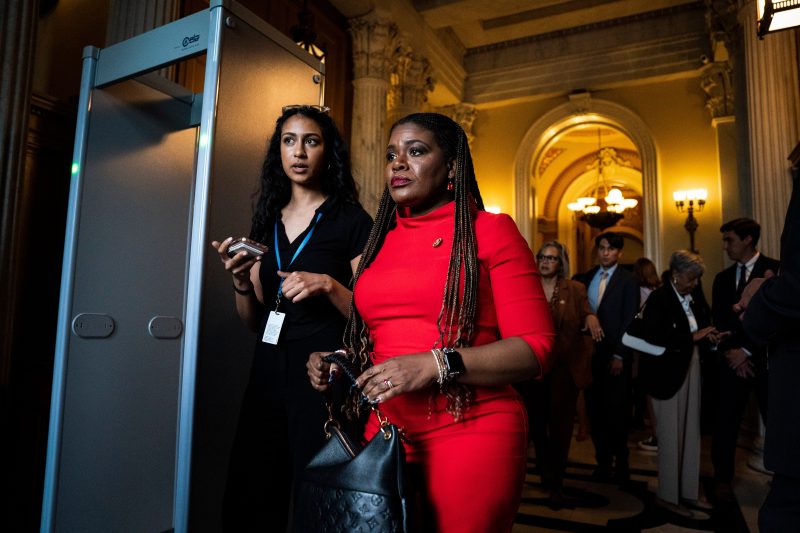Pro-Israel interests pour millions into defeating a second “Squad” member

ST. LOUIS — The mail carrier arrived to deliver the attack ads at the same time Rep. Cori Bush (D-Mo.) arrived to dispel them.
“He’s about to hand you some lies about me,” Bush said as the carrier handed a glossy leaflet to a voter at a home in Old North St. Louis where she was canvassing for votes.
“All we ever see about you are negative ads,” the woman barked back at her as she pulled the handbill out of a stack of mail. “You need to get some of your own!”
“It’s because I called for a cease-fire in Gaza,” Bush replied. “That’s where all of this started.”
In Missouri’s 1st Congressional District, the pro-Israel lobby is pouring millions into a campaign to unseat Bush as part of a broader, well-funded effort to replace critics of the Israeli government and the war in Gaza, such as Bush, with more Israel-friendly Democrats. Outside groups have already spent over $15 million in this race, according to Open Secrets, a Washington nonprofit that tracks campaign finance and lobbying data. More than 80 percent of that money has gone toward ads opposing Bush and supporting her opponent.
A prominent member of the Squad of far-left Democrats, Bush was the first member of Congress to call for a cease-fire between Israel and Hamas, nine days after Hamas’s Oct. 7 attack on Israel. She has described Israel’s subsequent invasion of Gaza — which, according to the Gaza health ministry, has killed nearly 40,000 Palestinians — as a genocide. (Israel has denied the allegation in hearings at the U.N.’s top court.)
Bush is facing a tight primary contest Tuesday against St. Louis county prosecutor Wesley Bell, who is backed by the American Israel Public Affairs Committee (AIPAC), a powerful pro-Israel group. By the end of June, Bell, a former member of the city council who pushed for policy changes after a police officer killed 18-year-old Michael Brown in 2014, had four times more cash on hand than the incumbent.
Bell and Bush are liberal Black Democrats who were born and raised here and who entered public service after protests against police shooting unarmed Black men. Both are beating back allegations of improper behavior: Bush faces a federal investigation over allegations that she misused campaign funds to hire her husband to provide security, and Bell faces a civil trial that has been delayed until January over allegations that he fired people based on their gender, age and race. Both candidates have denied wrongdoing.
But other than their conflicting positions on Israel — which has not been mentioned in any of the ads AIPAC’s Super PAC, the United Democracy Project, has spent $8.86 million on — the dispute seems to be over political style. At the heart of the race is a question: Should voters here elect a candidate who will vote with the Democratic Party, or one who will challenge its direction?
AIPAC and other pro-Israel groups spent $17 million to help defeat Rep. Jamaal Bowman (D-N.Y.) in a June contest that became the most expensive House primary in U.S. history but could be surpassed by this race. Bush, an outspoken critic of Israel’s nine-month war in Gaza, is their next target.
The National Black Empowerment Action Fund, founded by AIPAC veteran Darius Jones, threw $1 million to the race last week. Jones described Bush as an “extremist” who uses her position to champion issues that will elevate her own profile to the detriment of the Black community.
At the voter’s home in Old North St. Louis, the constituent and the mail carrier said the huge numbers of ads had left them deeply confused about what to believe.
While Bush says her constituents resent having their tax money funding the bombing of civilians — drawing parallels to the Black Lives Matter movement — Bell said in an interview that she is “wrong” in her stance and that while he does not want to see “a single innocent civilian hurt,” he would continue to stand with Israel against a “genocidal” Hamas.
In interviews, most of the more than a dozen voters across the district did not know that a difference in opinions over the Middle East had triggered the flood of money into their local primary. Most also said that although they found the issue important, it would likely not be a deciding factor in who they vote for. In a district with a lower-than-average median household income and some of the highest rates of violent crime in the country, voters are worried about inflation, the cost of living and safety.
Jovan Manuel, 35, was one of the many voters who said that while the war embroiling the Middle East is awful, it would not affect his vote. “As far as I know, it’s a centuries old issue … We have to prioritize us, our children, our schools, instead of trying to fix that,” he said.
Spending a Saturday afternoon in a park in Ferguson with his family, he said he was not aware that pro-Israel groups were supporting Bell’s campaign. “I don’t know how I feel about that,” he said. “But people around here are fed up of Cori [Bush] and feel like she hasn’t done enough,” he said, adding that his vote would still likely go to Bush’s opponent.
Ads funded by the UDP and Bell’s campaign have largely focused on Bush’s two terms on Capitol Hill, pointing out how the activist-turned-lawmaker voted against several major Democratic or bipartisan bills that President Biden ultimately signed into law. Bell, who was also a liberal activist before becoming a prosecutor for the county, has pledged to work with the Democratic Party to pass major initiatives rather than “grandstand,” as he mentions in his campaign ad.
Patrick Dorton, a spokesman for UDP, said its endorsement of Bell was because of Bush’s “horrific anti-Israel record” as well as her “record of voting against President Biden and the interests of her own St Louis district.”
“I don’t know what Cori Bush is doing in Washington, but she’s not helping us here … She fights with Biden, she votes against our jobs, she gets nothing for us,” a man wearing a hi-vis jacket says in one of UDP’s ads. “I have had enough of Cori Bush, she did not deliver for St. Louis.”
In an interview, Bell denied being actively recruited by AIPAC, saying he had no communication with the group before he decided to run for Congress. He call AIPAC “an interest group just like clean energy is an interest group.”
Those in Bush’s camp see it differently. In her ads, Bush has said “St. Louis is not for sale,” attacking Republicans for meddling in the primary.
“Wesley Bell is taking money directly from the same Republican megadonors spending millions to elect Donald Trump and JD Vance to the White House,” said Usamah Andrabi, a spokesperson for Justice Democrats, a liberal political action committee dedicated to electing far-left candidates to Congress that has poured $2.3 million into the race.
“It’s deceitful,” Bush said in an interview. “If AIPAC and UDP decided to run [Bell] because they want someone who is going to say that they stand 100 percent with Israel … then say that in the commercials.” She views it as a projection of AIPAC’s power. “What they want to do is show that if you go against them, then you are at risk,” she added.
Bush’s personal story resonates with many voters here. She catapulted into the national spotlight as an outspoken activist during the Black Lives Matter protests in 2020, which gave her momentum to unseat Rep. William Lacy Clay, a centrist Democrat who held the office for two decades. Bush has since spoken openly — given that abortion is on the ballot in Missouri in November — about being raped and getting an abortion when she was younger. She has also recounted facing eviction. Her most notable act in Congress may have been protesting the expiration of the pandemic eviction moratorium by sleeping three nights on the House steps in 2021, which ultimately resulted in a temporary extension of the policy.
But after four years, Bush’s outsize, outspoken personality now appears to polarize her district. Voters describe her either as one of the most authentic St. Louisans they could have in office and a breath of fresh air, or as someone who has prioritized her personal politics above her district’s interests.
One of her biggest local vulnerabilities is that she voted against Biden’s Bipartisan Infrastructure Act, drawing the ire of local labor unions, many of which are now backing Bell.
Bush has also missed 187 votes between January 2023 and June 2024, making her fifth among lawmakers with the most missed votes, according to an analysis by Derek P. Willis of the University of Maryland and reviewed by The Washington Post. Of the four members who missed more votes, two were being treated for cancer, one had a spouse who died suddenly and one was running for president. Bush’s office acknowledges she missed 100 votes over three days for a covid diagnosis, 56 votes one week after the sudden death of a loved one, and several after surgery.
Bush remains under federal investigation into use of campaign finances over allegations of improperly hiring her husband to provide security. In a Jan. 30 meeting, Bush told staff that improperly using campaign funds could be viewed as “messed up,” according to an audio recording provided to The Post.
“One thing to remember is, there are people who are very, very angry with us, powerful people who are angry with us because we say ‘cease-fire,’” she said then.
Bush also told staff that the Justice Department was investigating her to prevent the appearance of a Democratic administration avoiding looking into Democrats. She encouraged her staff to stick by her — like the Rev. Martin Luther King Jr.’s followers did while he was being investigated — and suggested that the government was using similar tactics as COINTELPRO, a reference to the 1960s-era FBI counterintelligence program to try to derail uprising radical movements.
“Look at what’s happening, the history-making moment that we are in the middle of. Do we run from it because it’s tough … or do we push through and walk through it and come out on the other side victorious for the people who need us the most,” Bush told staff. “Can I make a mistake? Absolutely, we all can make mistakes. I’m not infallible.”
In a statement responding to both the audio and the investigation, Bush said it was her “understanding from my attorneys that the investigation appears to be concluded and we are just waiting on formal word from the Department of Justice,” which she thinks will “find no wrongdoing.”
The Justice Department declined to comment.
Bell awaits a civil trial in a discrimination lawsuit filed against him by a former assistant prosecutor who claims he fired her and other prosecutors because of their age, gender and race. And though he drew support from the activist community early in his career after making his name as someone who mediated between protesters and the police, many were dismayed when he declined to prosecute Darren Wilson, who killed Brown in 2014. The Department of Justice also declined to prosecute Wilson.
Bell’s detractors also accuse him of opportunism, pointing to the fact that he had been running against Sen. Josh Hawley (R-Mo.) — a race he was unlikely to win — until shortly after the Oct. 7 Hamas attack in Israel, when he dropped out to challenge Bush. He said that decision was rooted in his view that Bush was more interested in issues he sees as lower priorities for people in the district.
Abbie Cheeseman reported from St. Louis and Washington, D.C. Marianna Sotomayor reported from Washington, D.C. Leigh Ann Caldwell contributed to this report.




